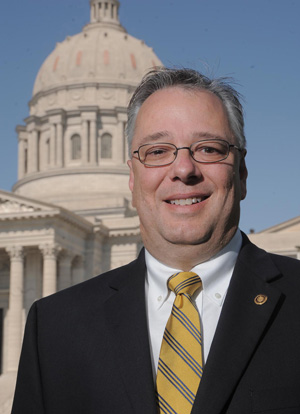
Rep. TJ Berry
– State Rep. T.J. Berry has called on Gov. Jay Nixon to call a special session of the General Assembly to “fix some of the issues” in House Bill 253, controversial tax cut legislation vetoed by Nixon earlier this summer.
Berry, a Republican from Kearney who sponsored the bill, submitted an official request to Nixon in a letter on Wednesday afternoon, one week before lawmakers were set to meet for veto session. Berry said the session should run concurrently to veto session which is scheduled to start next Wednesday.
“[W]e should do our best to work together in the spirit of cooperation that the people of Missouri expect from their elected officials,” he said. ” I truly believe Missourians want to see us reach some sort of compromise on this important issue and that we should do all we can to find the common ground necessary to make a tax cut for working Missourians a reality.”
Berry said he was making his call in light of a legal opinion by Attorney General Chris Koster, a Democrat, who sided with Nixon and his claim that the bill would allow Missourians to collect three years of retroactive tax refunds, potentially costing the state hundreds of millions of dollars.
“I assure you that, if you call the legislature into extraordinary session, we will have a clean tax cut bill on your desk in a matter of days and at a minimal cost to taxpayers,” Berry wrote.
Scott Holste, a spokesman for Nixon, said Nixon is ready to have a debate about the issue when the legislature convenes for regular session in January on “responsible changes to the tax code, including comprehensive tax credit reform, which would create jobs and protect investments in education.”
“The sponsor’s acknowledgement of the serious flaws in House Bill 253 reflects the growing bipartisan opposition to this reckless experiment that would raise taxes on prescription drugs, defund our public schools and jeopardize Missouri’s AAA credit rating,” he said. “But as the many errors in this legislation demonstrate, trying to throw something together at the last minute is not the responsible approach to an issue as complex and important as tax policy.”
